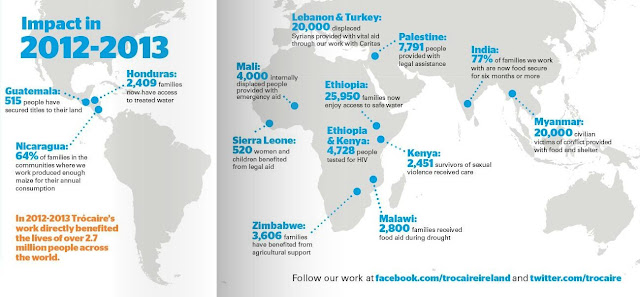If you set up an organisation or group whose purpose is to make the world a better place you would generally look in to calling yourself a charity. But the benefits of having the word 'charity' associated with you are really beginning to get outweighed by the drawbacks and negativity surrounding the word. You might be better off calling yourself a 'social enterprise'.
Here are 13 reasons why it sucks to be a charity in Ireland right now:
1. Nobody Cares What You're Doing
The media, the public, everybody - we just keep asking charities about their finances and their staff salaries. Or, on a more positive note, we'll sometimes talk about fundraising events and mini-marathons and pub quizzes. But nobody is talking about what charities are actually achieving and the impact they are having. Yes, good charities are providing that information - the proof of their good work...We just don't read it, share it or care about it.
2. People Want Good Governance But Nobody Is Willing To Pay For It
Everyone wants to see good governance from charities. We want to see transparency, good reporting, thorough accounting and more. But nobody wants their donation to go towards admin.
CHY-22.
3. Your Staff Are Paid Less For Doing Good
If you work in the charity sector you're automatically earning 18% less than if you were doing the same job in the private sector, and that figure gets much higher in some roles. Yes, we're happy to reward you financially if you're making the world a worse place...but if you're working with the world's most vulnerable people then that should be it's own reward.
Nevertheless, the public still think charity staff are overpaid without batting an eyelid at private sector pay. Many people think charities should rely on volunteers, but people who register to volunteer on average only give about an hour a month of their time - how could any organisation run like that?
4. Changes In Tax Relief Have Cost You Money
Charitable tax relief in Ireland sucks in a lot of ways. But the latest changes to tax relief are good: charities now get the relief on donations from self-assessed individuals. However, charities won't see that relief until next year. In 2013 they just have to put up with the reduced income caused by self-assessed donors giving less (because it now costs them more).
5. City Councillors Hate You
Over 30% of Dublin City Councillors felt that no charity should financially benefit from a shop on Grafton Street. It didn't matter what you sold, what you looked like or even what consumers wanted. If a charity was going to generate income then these councillors wanted you banned.
6. You're Judged On Others' Behaviour
If a different charity has done something wrong, well you're going to be tarred with the same brush. We wouldn't dismiss 'businesses' because we had a bad experience with a business, but if a 'charity' does something rotten, well then all 'charities' are rotten.
7. The Regulator Is Going To Cost You
The Charity Regulator will finally appear next year, which is great news for everyone. Unfortunately, for the first year they're probably going to have the resources to do very little except copy and paste the list of charities registered with Revenue. Charities are going to pay an annual fee for that.
8. The Data Commissioner Is Making It Harder To Compete With Businesses
If the recent Irish Times article is to believed, the DPC has changed their interpretation of when it is and isn't acceptable for a charity to 'market' to its database, and this new interpretation does not seem to be in line with what private companies can do.
9. Charity Scratchcards Are About To Get Destroyed
When the National Lottery appeared the Government agreed to compensate charities who generated income from scratchcards. They did this because charities have an embarrassingly low limit on how much they can pay out in prize money, so can't compete. The compensation will go and these charity scratchcards will wither away and die because, frankly, why would you try to win €20k when you could win €4 million?
10. People Hate Your Most Cost-Effective Forms Of Fundraising
The most tolerated forms of fundraising (such as events, cash collections and selling stuff) are the most expensive and least efficient ways to raise money. Every form of fundraising people hate? Well, unfortunately they're much better.
11. The Most Unethical Corporate Sponsors Have The Most Money
Think of the top companies in Ireland: Alcohol, cigarettes, oil, gambling, financial investments. They're the ones with all the money. When they're not busy killing people and destroying our planet they'll sometimes donate money to charity. The really clever ones donate other people's money and take credit for it. Unfortunately, a lot of charities have to refuse this money because they have to behave ethically and, to be honest, they're trying to fix the problems these companies caused.
12. People Think There Are Too Many Charities
In fact, there are are less charities per person in Ireland than in countries like Wales, Scotland and Norway. But, assuming there were too many charities, nobody is actually able to specify which charity should or could be eliminated.
13. Large International Charities Are Pretending There Are No Admin Costs
Large well-known charities like Charity: Water have enough support from businesses and foundations to pretend that public donations will not go on 'admin'. The whole thing is meaningless and nonsense, but it gives the Irish public an unrealistic expectation that charities can operate with little or no overheads. This restricts small to medium charities and cripples their ability to grow.







